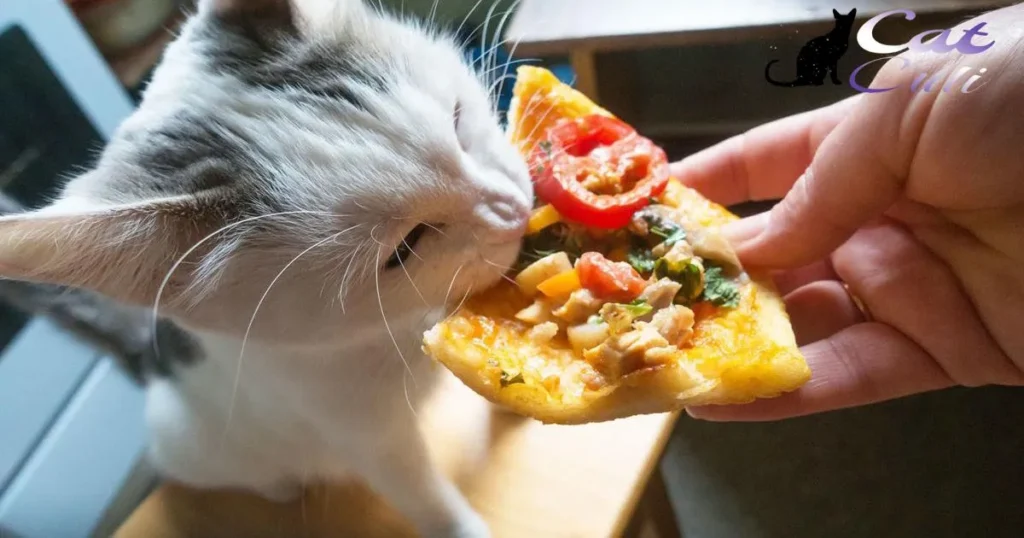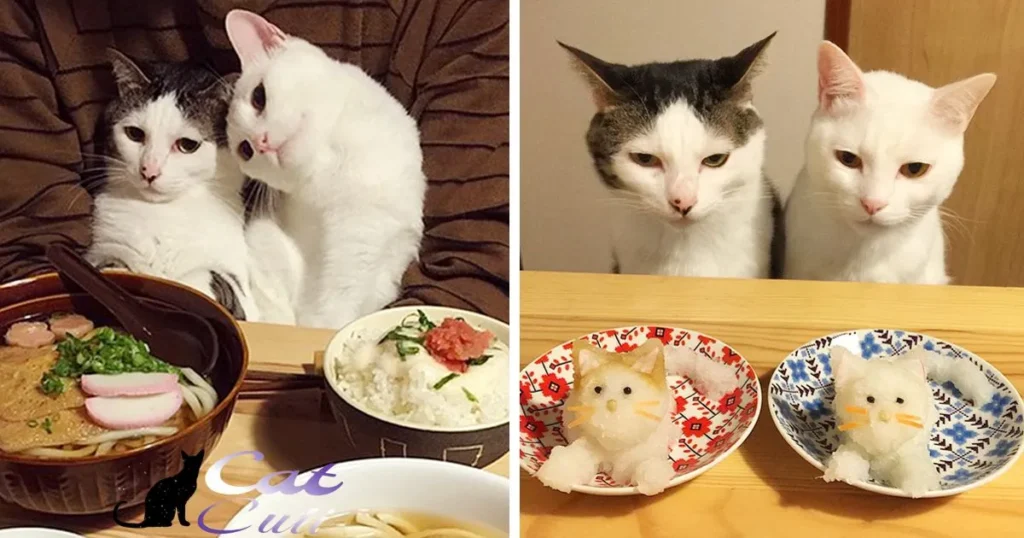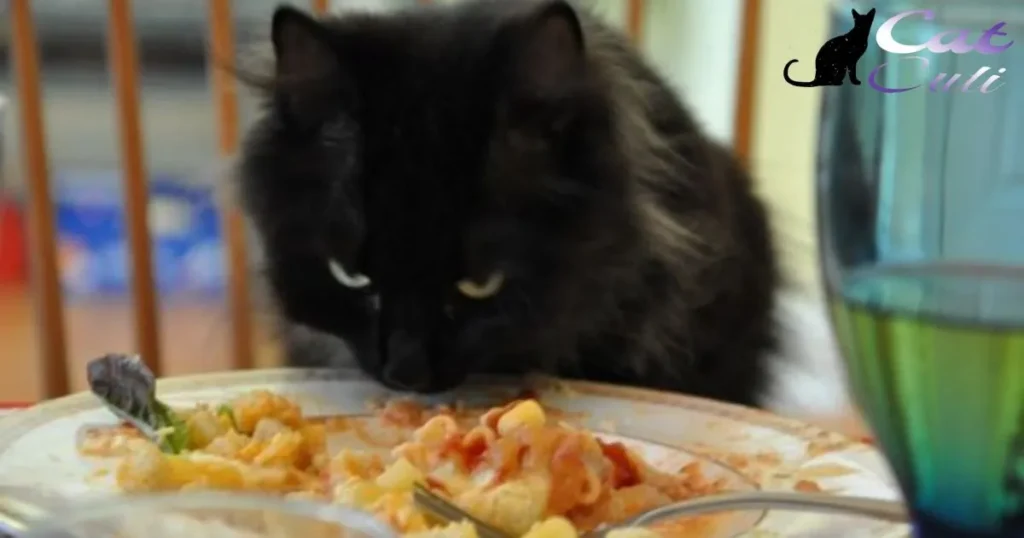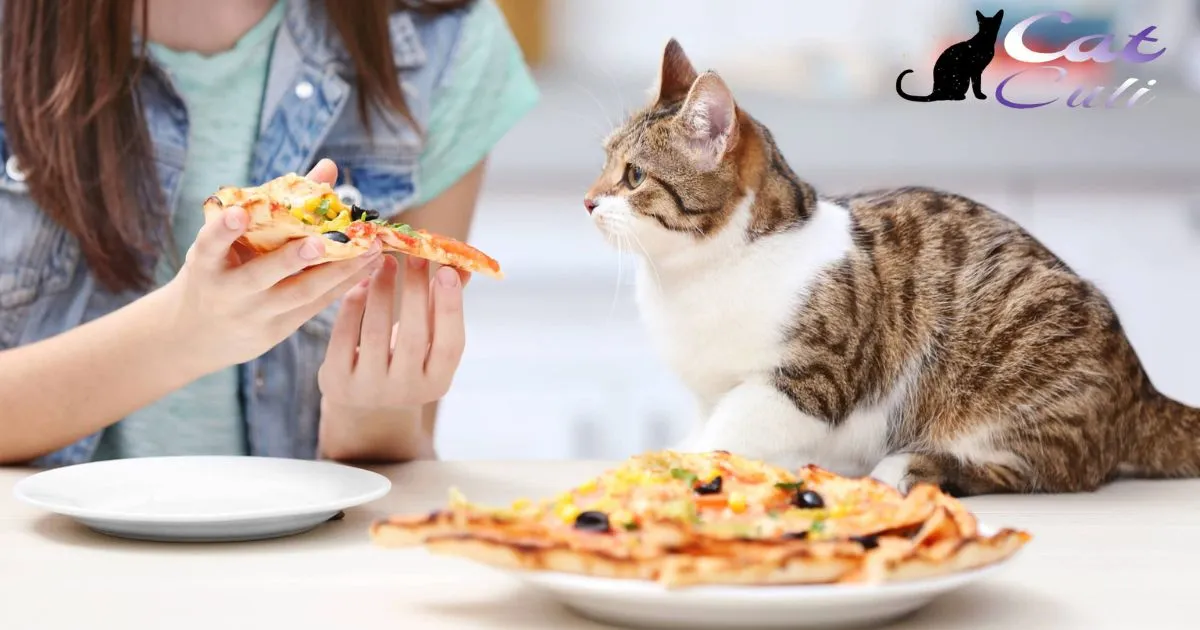If your cat starts eating human food out of the blue, it could signal a change in their diet preferences. Sometimes, cats explore new tastes or develop a liking for something they’ve observed you eating. This behaviour might also point to an underlying health issue or nutritional deficiency, so it’s wise to monitor their diet and consult a vet if it persists.
Ever wondered, Why is my cat suddenly eating human food? Picture this: your furry friend, once content with their kibble, now eyeing your dinner plate with newfound curiosity. This mysterious shift in behaviour raises questions about their preferences, health, and the reasons behind this culinary exploration.
It’s essential to monitor this behaviour as it might signal a health issue or nutritional deficiency. Consulting a vet can shed light on the underlying reasons and help guide your furry friend back to a balanced diet. Stay with us to learn more about this intriguing feline behaviour.
Most Abandoned Cats Got By On Human Food
Abandoned cats often rely on human food for survival. They scavenge for scraps left behind or seek handouts from kind-hearted people. These cats learn to adapt to whatever food they can find, making human leftovers a significant part of their diet.
Surviving on human food becomes a norm for many abandoned cats. They scurry around neighborhoods, searching for any accessible food sources, sometimes relying solely on the generosity of strangers or finding their meals amidst discarded scraps.
7 Possible Reasons Your Cat Is Suddenly Eating Human Food
- Curiosity: Your cat might be intrigued by new smells and tastes, exploring human food out of curiosity.
- Dietary Changes: Changes in their diet preferences or dissatisfaction with their current food could lead to exploring human food.
- Behavioural Imitation: Cats may mimic their owners’ eating habits and show interest in human food.
- Health Issues: Certain health conditions or deficiencies might prompt cats to seek alternative food sources.
- Attention-seeking: Seeking attention or attempting to communicate their needs could drive cats to eat human food.
- Boredom or Stress: Cats might turn to human food when bored or stressed, seeking stimulation or comfort.
- Food Availability: Limited access to their regular food might lead cats to scavenge for human food.
How Do I Get My Cat To Stop Begging For Human Food?
If your cat begs for human food, try establishing a routine by feeding them at specific times using their own bowl. Avoid giving in to their demands, as it reinforces the behaviour. Instead, provide affection or playtime to distract them when they beg.
Another effective method is to ignore begging completely. Cats learn that begging won’t result in food and may eventually stop. Ensure your cat has a balanced diet with high-quality cat food to reduce their interest in human food.
Is It Ok For My Cat To Eat Human Food?
Feeding your cat human food occasionally might seem harmless, but it’s essential to be cautious. Human food often lacks the nutrients tailored for a cat’s specific needs, potentially causing health issues.
While a tiny bit of cooked meat or veggies occasionally won’t harm, some human foods like chocolate, onions, or garlic can be toxic for cats, leading to severe complications. Always check with your vet before introducing human food into your cat’s diet to ensure it’s safe.Your cat’s digestive system isn’t designed for human food.
Even though they might show interest or beg for a taste, sticking to a balanced cat-specific diet is crucial for their well-being. Too much human food can upset their stomach or lead to obesity. To keep your feline friend healthy and happy, focus on their specialized cat food, and offer treats specifically made for cats as occasional indulgences.
Human Food That Cats Can Eat

Cats can safely eat certain human foods in small amounts, like cooked meat such as chicken or turkey without seasoning. These proteins offer a tasty alternative to their regular diet and can be a good source of additional nutrients.
Vegetables like cooked carrots or steamed green beans also serve as healthy snacks for cats, providing fibre and essential vitamins.Some human foods can be harmful to cats. Avoid giving them items like chocolate, onions, garlic, or grapes as these can be toxic and cause serious health issues.
It’s crucial to research and double-check before sharing any human food with your feline friend to ensure it’s safe and won’t upset their stomach or harm their health.
Human Food That Cats Should Not Eat
Cats shouldn’t munch on certain human foods as they can harm their health. Chocolate, for instance, contains theobromine, toxic for cats, causing vomiting and even seizures. Onions and garlic, common in many dishes, can lead to anaemia in cats, affecting their red blood cells.
Grapes and raisins might seem harmless but can trigger kidney failure in cats. Foods high in fat, like bacon or fried treats, may lead to pancreatitis. Being cautious about what human foods your cat gets access to ensures their well-being and avoids potential health risks.
What Should You Do If Your Cat Is Obsessed With Human Food?
If your cat’s fixated on human food, first, keep temptation out of reach by securely storing all edible items. Ensure their regular cat meals are satisfying; consider high-quality options to curb their cravings.
Engage them in playful activities or provide stimulating toys to divert their attention from human food. Consulting a vet can offer insights into their behaviour and health.
Redirecting their focus to cat-friendly treats and reinforcing good behaviour with positive reinforcement can help break the obsession with human food. Consistency in routines and patience will guide your feline friend back to a healthier diet and happier habits.
Ignore Your Cat If She Begs For Food
When your cat begs for food, ignoring this behaviour helps discourage it. Responding to begging reinforces the idea that begging leads to a reward, making it a persistent habit.
Feed Your Cat At Least Four Times A Day
Offer your cat regular meals throughout the day. Splitting their daily food intake into at least four smaller portions helps maintain their metabolism and prevents overeating in a single sitting.
Play Often With Your Cat
It’s an excellent way to gauge whether your cat is food obsessed as their behavior during playtime can reveal their overall focus and interests beyond just meals.
Give Your Cat Food That Is Rich In Nutrients
Choose cat food that provides essential nutrients. High-quality cat food contains the necessary vitamins, minerals, and proteins crucial for your cat’s overall well-being and health.
Initiate Positive Feeding Patterns For Your Cat
Establishing consistent feeding times and locations creates a positive routine for your cat. Predictable feeding schedules and designated feeding areas help reduce stress and encourage healthy eating habits.
Cats Are Obsessed With Human Food: What Are The Reasons?

Cats’ fascination with human food stems from their natural curiosity and keen sense of smell. They’re drawn to the aromas and flavours, making them curious about what we eat. Another reason for this obsession lies in the social aspect cats often mimic their owners’ behaviours, including showing interest in the food they see humans enjoying.
Some human foods might appear more appealing to cats due to their stronger smell or taste, sparking their interest. It’s crucial to note that not all human foods are safe for cats. Understanding these reasons helps pet owners manage their cats’ curiosity and ensures they maintain a healthy diet without indulging in potentially harmful treats.
- Cats Are Curious Creatures: Known for their inquisitive nature, cats are naturally curious beings. They’re often intrigued by new scents, sights, and tastes, which can lead them to explore human food out of sheer curiosity.
- Cats Are Great Imitators: Cats tend to mimic behaviours they observe in their human companions. If they see their owners eating certain foods, they might become interested and try to sample those foods themselves.
- Cats That Are Abandoned Are Used To Eating Human Food: Cats that have been abandoned or stray cats may be accustomed to scavenging for human food as a means of survival. This behaviour can persist even when they’re adopted into a new home.
- Some Cats Are Spoiled By Their Owners: Certain cats are indulged with treats or scraps from the table by their owners, leading them to prefer human food over their regular cat food.
- Your Cat Is Sick: Changes in a cat’s eating habits, including an increased interest in human food, can sometimes indicate an underlying health issue. It’s essential to monitor such changes and consult a veterinarian if necessary.
- Your Cat Is Bored Or Stressed: Cats might seek out human food if they’re feeling bored or stressed. In such cases, providing mental stimulation and environmental enrichment can help alleviate this behaviour.
If You Think Your Cat Has Been Poisoned
If you suspect your cat’s been poisoned, act fast. First, identify the toxin and remove your cat from the area immediately. Call your vet or an emergency pet hotline for guidance on what to do next. Time is crucial in these situations, so swift action can make a significant difference in your cat’s recovery.
While waiting for professional help, don’t try to induce vomiting or give any home remedies without expert advice, as it might worsen the situation. Stay calm, gather any potential evidence of what your cat might have ingested, and get them prompt medical attention for the best chance of a positive outcome.
Human Foods Are Not Meant For Cats
Cats should not eat human food because it might harm them. Some foods like chocolate, onions, and grapes can be toxic to cats, causing severe health problems. Feeding cats with a proper diet formulated for their nutritional needs ensures their well-being and prevents potential health risks.
It’s important to keep human food out of reach from cats. Educating ourselves about safe and unsafe foods for cats is crucial to prevent accidental ingestion. Always consult with a veterinarian to ensure your cat’s diet aligns with their specific nutritional requirements and avoid feeding them any human food to maintain their health and happiness.
Foods That Are Toxic To Cats
| Toxic Foods for Cats | Potential Harm |
| Chocolate | Can cause vomiting, diarrhea, tremors, and seizures. |
| Onions & Garlic | Lead to anemia and digestive issues. |
| Grapes & Raisins | Can result in kidney failure. |
| Caffeine | Affects the nervous system, causing rapid heart rate, tremors, and seizures. |
| Alcohol | Leads to intoxication, vomiting, coordination problems, and even coma. |
| Xylitol (sweetener) | Causes a sudden release of insulin, leading to low blood sugar and liver failure. |
| Raw Eggs, Raw Fish | May contain bacteria or parasites harmful to cats. |
Is Your Cat Hungry Due To An Underlying Medical Problem?
Your cat’s hunger might not just signal a rumbling tummy; it could hint at an underlying medical issue. Health problems like diabetes or hyperthyroidism can spark an increase in appetite. Keep an eye on any unusual eating habits or sudden changes in weight they could be subtle signs of an underlying medical concern.
If you notice your cat constantly craving food despite a balanced diet, it’s crucial to visit the vet. Identifying and addressing any medical issues early on can ensure your feline friend stays healthy and content. Regular check-ups help catch these concerns before they escalate, keeping your cat’s well-being in check.
Is Your Cat Hungry Because She Isn’t Getting The Right Nutrition?
If your cat seems constantly hungry, it might signal a lack of proper nutrition. Cats require specific nutrients for their well-being, and an inadequate diet could leave them unsatisfied. Ensuring they receive a balanced diet tailored to their needs can help address their hunger and keep them healthy.
Observing your cat’s behaviour and dietary habits can provide clues about their nutritional needs. A vet can offer guidance on the right food choices and portion sizes, ensuring your furry companion gets the essential nutrients for a satisfied and contented life.
Helping Your Cat To Become Less Obsessed With Food
To ease your cat’s food obsession, engage them in regular play sessions to divert their focus from eating. Try feeding them smaller, more frequent meals to regulate their hunger and prevent excessive cravings. Consider puzzle feeders or interactive toys that dispense food slowly, encouraging mental stimulation while they eat.
Introduce gradual changes to their feeding routine, incorporating healthier options or specialized diets as advised by your vet. By creating a consistent meal schedule and providing enriching activities, you’ll help your cat develop a balanced relationship with food and curb their obsession.
Old Cat Wants Human Food

Your senior cat showing interest in human food might crave new flavours or textures. As cats age, their taste preferences can change, leading them to seek variety beyond their usual diet.
Offering safe, cat-friendly human foods in moderation can provide a treat while ensuring their health isn’t compromised. Keep an eye on their weight and consult a vet to ensure their dietary needs are met, keeping your older cat happy and healthy.
An older cat wanting human food could signal boredom with their regular meals. Cats may seek variety as they age, so enriching their diet with occasional safe human treats can satisfy their curiosity. Always prioritize their health by avoiding harmful foods and maintaining a balanced feline diet, promoting a contented and nourished senior cat.
How To Stop Cat From Eating Human Food
To deter your cat from nibbling on human food, keep tempting items out of reach and securely stored. Place their food and water bowls in a designated spot away from your dining area. Offering stimulating cat-friendly toys or treats can redirect their attention from human food.
Ensure their meals are consistent and satisfying to discourage scavenging tendencies.Consistency is key in dissuading your cat from indulging in human food. Employ positive reinforcement by praising and rewarding them when they choose their own meals over human fare.
Establishing a routine for feeding times helps reinforce their reliance on their own food. Patience and persistence are crucial in training your cat to stick to their intended diet.
How To Get My Cat To Stop Eating Everything
To halt your cat’s culinary adventures, try these simple tactics. First, keep tempting items out of reach by storing them securely in cabinets or using pet-proof locks. Next, provide stimulating toys or puzzles to divert their attention away from inappropriate munching.
Maintain a consistent feeding schedule with high-quality cat food to satisfy their nutritional needs. Consistency and redirection are key to steering your cat away from devouring everything in sightConsider creating a safe environment by removing plants that may be toxic to cats and ensuring household chemicals are inaccessible.
Offer designated chewing options like cat grass or specific chew toys to redirect their chewing tendencies. Consistency in training and environmental management will help break this habit and encourage healthier eating habits for your feline friend.
What Human Food Can Cats Eat Everyday
Cats can safely eat certain human foods daily. Cooked eggs offer a protein boost, while plain, cooked chicken or turkey provides a meaty treat. Veggies like steamed carrots or green beans offer vitamins. Just ensure they’re cut into bite-sized pieces for easy eating.
Avoid certain foods like onions, garlic, or chocolate as they can be harmful. High-fat foods or dairy might upset their stomachs. Moderation is key when introducing new foods, ensuring a balanced diet for your feline friend.
FAQ’s
Why is my cat trying to eat human food?
Cats might seek variety or mimic your eating. They could also lack nutrients or have a health issue, prompting new food exploration.
Why is my cat suddenly begging for human food?
Your cat’s curiosity might be piqued by your meals or a change in routine. It could also signal dietary dissatisfaction or boredom.
Why does my cat want my food all of a sudden?
New smells or tastes might intrigue your cat. Ensure their diet is balanced, and consider behavioural training to discourage this habit.
How do I train my cat not to eat human food?
Gradually introduce deterrents, like unpleasant scents or tastes near human food. Reinforce positive behaviour with rewards and praise.
Conclusion
In conclusion, understanding Why Is My Cat Suddenly Eating Human Food? involves recognizing their curiosity, potential health concerns, or simply an intrigue for new flavours. Monitoring their diet and ensuring proper nutrition can help curb this behaviour. Remember, it’s crucial to consult a vet if this habit persists or if you suspect underlying health issues.
Ultimately, addressing this change in behaviour involves a mix of vigilance, a balanced diet, and sometimes behavioural training. By staying attuned to your cat’s needs and preferences, you can guide them back to their regular diet and ensure their well-being.








